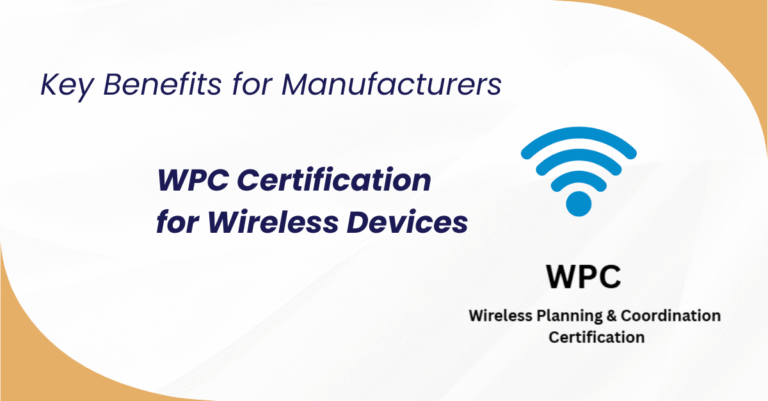The Wireless and Planning Coordination Wing (WPC) ensures the safety, quality, and reliability of wireless devices, which is one of the major benefits of WPC Certification. In today’s digital world, the demand for wireless products is rising. Wireless products are used in day-to-day life across various fields. Ensuring the quality and safety of these products is essential in the digital revolution.
The WPC is a regulatory body for granting certificates to wireless and radio frequency-enabled products that are sold, manufactured, or imported into the Indian market. The approval facilitates easier market access and also business growth in the global markets.. Let’s explore more benefits of WPC Certification in detail.
What is WPC Certification?
The WPC License is a legal requirement and is responsible for maintaining Indian safety and quality standards and issuing licenses for wireless devices. The government of India establishes the WPC under the Ministry of Communications and Information Technology. Wireless Planning and Communication (WPC) Wing issues the certificate. It is a benchmark for quality in the Indian wireless market.
Entities such as manufacturers ( domestic or foreign), importers, traders, and suppliers intending to import, sell, or manufacture wireless equipment must obtain a WPC License. The approval will also ensure that the device operates within the standard frequency band without interfering with the existing frequency bands.
Different types of WPC Licensing:
There are three types of WPC Certification.
- Non-Network License includes
- Import License
- Dealer Possession License
- Non-dealer Possession License
- Network License includes
- Internet Service Provider( ISP ) License
- Experimental License
- Equipment Type Approval
Eligible entities for WPC Certification:
Businesses that require WPC Approval to sell or import wireless products are as follows.
- Manufacturers: Both domestic and foreign manufacturers are eligible to sell or import wireless products under lawful conditions.
- For foreign manufacturers, an Authorised Indian Representative (AIR) is required to initiate the process on their behalf.
- Domestic manufacturers who have an office in India can apply for WPC Certification without an AIR.
- Importers/Distributors: to import and distribute certified products. However, they may require an Importer License for wireless products to ensure adherence to regulatory standards.
- Service providers: to provide services by using specific frequencies.
- Research and experimental organizations: to get an experimental license.
- OEMs: for certifying wireless components within the products.
Key Benefits of WPC Certification for Wireless Device Manufacturers:
Here are the key benefits of WPC Licensing in detail.
- Lawful Compliance: The certification is a legal requirement established by the government of India. It mandates the entities to be certified under WPC for the sale and import of wireless devices in the Indian market. The WPC approval is a criterion for safety and quality.
- Easy Market Access: WPC-approved products enjoy easier market access as the licensing acts as a gateway to entering the Indian market. Businesses that obtain a WPC License can boost their sales, imports, and production more efficiently.
- Brand Value of the Device: A WPC-certified device ensures compliance with Indian standards of safety and quality. A brand that is certified will gain a reputation in the market. Hence, it will enhance the brand image.
- Gain Consumer Trust: As the Indian market is consumer-centric, consumers focus on the quality of the product. The quality is assured by getting the WPC approval. Certified products help build consumers’ trust in the brand.
- Safety Compliance: The WPC Certification is a legal requirement; it ensures the safety, quality, and reliability of wireless devices.
- Business Growth in Global Market: A WPC-compliant product ensures adherence to Indian standards and can also facilitate access to the global market. The approval paves the way for continuous growth and gives businesses a competitive edge. WPC License is also recognised as a trusted indicator of quality by other countries.
- Avoid fines: Non-certified wireless products or the sale and import of substandard products can lead to legal issues, seizures, and fines.
- Reduces the risk of interference: Wireless devices operate by transmitting signals over frequencies. Non-certified devices can interfere with other important wireless communications, such as aviation, emergency, or broadcast services.
- Support Innovation and Technology: The WPC Certification is an Indian standard compliance approval that encourages businesses to focus on innovation and technology for the development of new wireless devices.
- Government Support: The government also gives subsidies and incentives to WPC-certified equipment. It also supports the manufacturers who adhere to Indian regulatory standards.
Conclusion:
Manufacturers operating in the wireless devices and radio frequency-enabled products must get a WPC License. It is a legal requirement in India for the sale, import, and manufacture of wireless products. It enhances the consumers’ trust, gains access to domestic and global markets, ensures brand credibility, and avoids penalties. The WPC licence can foster innovation and technology with government support.
The process and documentation for the WPC licensing are time-consuming and difficult. To navigate the certification process, contact ERCS Pvt Ltd., headquartered in New Delhi, which is the leading global WPC consulting firm. The company is a team of professionals who will guide you through the WPC approval process, save you time, and streamline your business.


